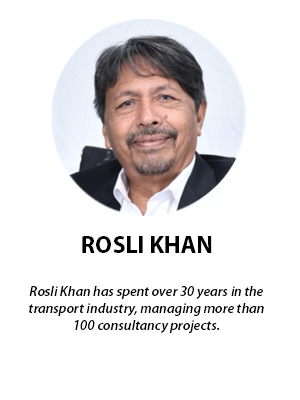
In the Dewan Rakyat on March 21, MP Lee Chean Chung (PH-Petaling Jaya) asked a very important question. He wanted to know whether the government will declassify the PJ Dispersal link concession agreement.
Instead of giving the matter the reply it deserved, deputy works minister Ahmad Maslan simply told Lee to refer his query to the chairman of the Malaysian Highway Authority.
But the question is one of public interest, as it has become quite apparent that Malaysia’s experiment with highway privatisation has resulted in monumental disappointment for the nation, its stakeholders, and citizens.
Lopsided concession agreements
Originally intended to alleviate the government’s burden of having to construct highways using its own resources and machinery, the task was outsourced to private sector companies via concession agreements.
However, those agreements have over the years appeared to be heavily lopsided in favour of concessionaires. How lopsided those agreements are is not known to the public. This is because they have been kept out of the public eye by being classified as official secrets, a notorious Malaysian practice.
Always negotiated and signed under a shroud of secrecy, it cannot be ascertained whether these agreements contain actual or inflated estimates as regards construction costs.
Questions have also arisen as to land acquisition costs, which are said to be borne by the government, and the processes involved in disbursing the necessary funds. These processes include payment of land costs to the concessionaire for onward disbursement. In such a scenario the opportunity for leakages of funds is always there.
In short, there are well-founded fears that concession agreements are prone to abuse.
Then there is the question of financing, which typically involves sukuk, a shariah-compliant version of government bonds, with government-owned banks likely involved in their management and arrangement.
These sukuk are then subscribed for by quasi-government entities. Are these sukuk sold at coupon rates set artificially high, based on inflated projected toll revenues? The data is not available to the public as it is typically protected from disclosure by secrecy laws.
In summary, the entire scheme is susceptible to fraudulent practices. The entanglement of government funds only serves to exacerbate the issue, rendering the costs of building a highway substantially more now, compared to before it was outsourced.
First exit route
Then there are exit routes for concessionaires many of us are unaware of.
First, it is quite common for concessionaires to grant or award construction contracts to their own affiliated entities or partners at exorbitantly inflated rates. This method guarantees substantial profits by diverting funds.
Imagine securing a contract valued at RM1 billion when the genuine construction expenses amount to only half of that. In such a scenario, the allure of highway concessionaires securing a windfall at the first exit route becomes irresistible, as opposed to having to wait for profits to accrue over three decades of toll collection.
Again, details of these contracts are not available to the public, but it is common knowledge among many consultants involved in privatised highways that the total costs on a per km basis are way over the top.
No longer involved in highway construction, the government has no clue as to its actual costs, and rely heavily on privatised highway costings submitted by concessionaires, resulting in inflated costings becoming commonplace.
Second exit route
Another way in which toll concessionaires can generate immediate profit is by selling off equity as soon as highways are ready, completed and running. In these instances, prices are usually computed based on future earnings, offering another profitable means of exiting the venture.
Concessionaires do not target toll collections as the returns on their investment. Instead, many used the collection to repay sukuk holders, which are predominantly quasi-government entities, government-owned banks, or government-related institutions.
Should collections fall short, it can look to the government to raise toll rates or extend concession periods — a politically convenient solution that will please sukuk holders, a majority of whom are linked to the government anyway.
Meanwhile highway users continue to bear the brunt of unnecessary toll payments on top of many other taxes to support the government.
Earnest government
The reality is that the highway privatisation policy has unduly burdened the nation’s coffers and brought hardship to road users.
If the government is earnest about rectifying this flawed policy, it must cease awarding toll concessions immediately, cancel all pending agreements, and declassify all the past concession agreements for public scrutiny.
It should also consider going back to the old method of giving the public works department (JKR) the role of tendering for projects to construct and manage roads.
By reverting to these traditional processes, the government may well halve road and highway construction costs, save money on land acquisition, eliminate the unnecessary funding of sukuk, retain funds for the development of regional roads, and provide relief to the public from toll payments.
As Ahmad Maslan conceded in the Dewan, it may cost the government as much as RM450 billion to rectify our flawed highway policy. It would have cost the government a lot less than half of this figure, had they maintained the traditional method of managing road and highway construction instead of relying on outsourcing mechanisms.
But we cannot just look at the figure, say we are unable to afford it and continue our present course. The only way to address the issue is for the shroud of secrecy to be lifted so the country can explore a viable long-term solution.
If Sarawak can have its Pan Borneo Highway without tolls and sukuk, why can’t the rest of the country do the same?
Selamat Hari Raya to all; maaf zahir dan batin.
Drive safely for free on the two allotted toll-free days. We should be driving toll-free every day. - FMT
The views expressed are those of the writer and do not necessarily reflect those of MMKtT.



No comments:
Post a Comment
Note: Only a member of this blog may post a comment.